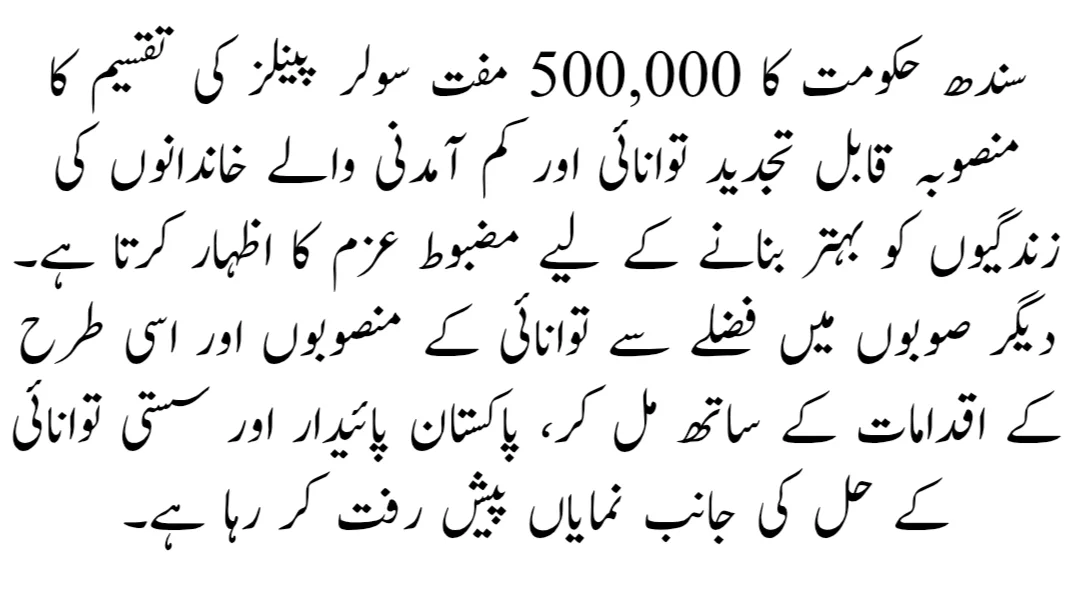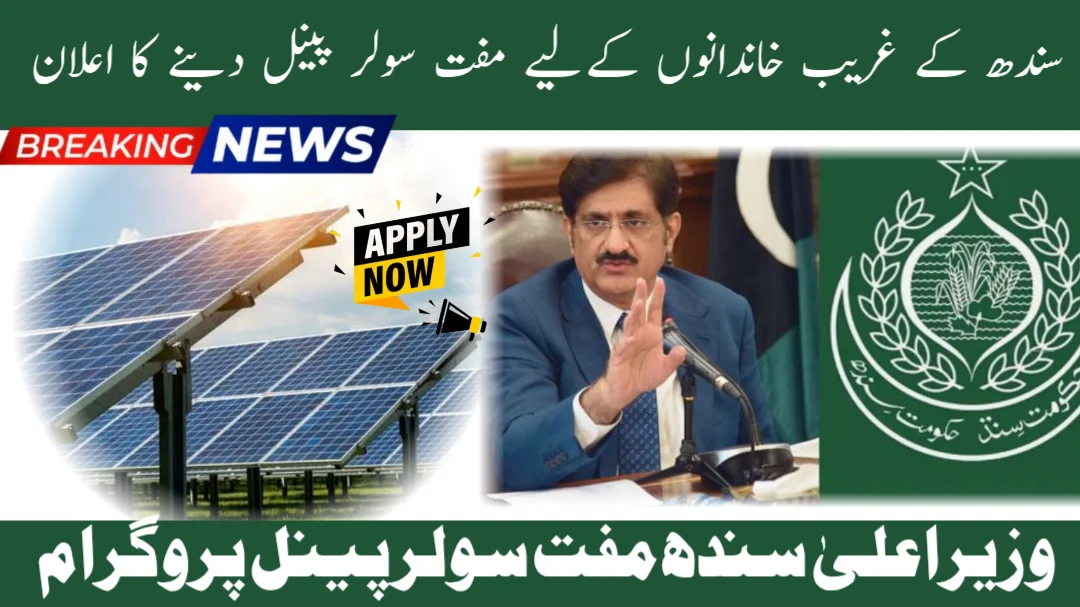The Sindh government has unveiled a groundbreaking initiative to provide free solar panels to 500,000 low-income families. This ambitious project aims to deliver sustainable, affordable energy to households that lack access to electricity, improving their quality of life while promoting renewable energy across the region.
Key Highlights of the Free Solar Panel Program
| Aspect | Details |
|---|---|
| Total Solar Panels | 500,000 units |
| Initial Allocation | 200,000 units |
| Additional Allocation | 300,000 units |
| Target Beneficiaries | Low-income families, off-grid areas |
This initiative reflects the Sindh government’s commitment to tackling energy poverty and providing long-term solutions to the region’s electricity challenges.
Phase 1: Initial Solar Panel Distribution Under BISP
The first phase of this program began under the Benazir Income Support Program (BISP). Initially, 200,000 solar panels were allocated for distribution, and 50,000 units have already been delivered to eligible families. The remaining units will be distributed shortly.
This phase prioritizes low-income households that lack access to conventional electricity. The goal is to alleviate energy poverty by offering renewable energy solutions that are both cost-effective and sustainable.
Phase 2: Expanding the Program to More Households
Following the directives of Pakistan Peoples Party (PPP) Chairman Bilawal Bhutto-Zardari, the Sindh government announced an expansion of the solar panel program. An additional 300,000 units will be distributed by the end of the year.
This expansion aims to cover a broader section of the 2.6 million off-grid households across Sindh. By increasing access to clean energy, the program hopes to improve living standards while reducing dependence on costly and environmentally damaging energy sources.

Waste-to-Energy Project in Karachi: A Sustainable Future
In a parallel initiative, the Sindh government is launching a waste-to-energy project in Karachi. This project aims to convert 15,000 tons of daily waste into 50 megawatts of electricity.
Key benefits of the waste-to-energy project:
- Reducing Urban Waste: Decreasing the burden of waste accumulation in Karachi.
- Generating Renewable Power: Providing clean, renewable energy to support the city’s growing demands.
- Environmental Benefits: Lowering greenhouse gas emissions and promoting sustainable energy practices.
This project complements the solar panel distribution initiative, highlighting the government’s multi-faceted approach to addressing energy and environmental challenges.
Punjab Follows Suit: Free Solar Panels for 100,000 Homes
Inspired by Sindh’s proactive approach, Punjab Chief Minister Maryam Nawaz has launched a free solar panel scheme for 100,000 homes. This initiative, with a budget of Rs10 billion, also aims to provide permanent relief from rising electricity costs.
Key Features of Punjab’s Solar Panel Program:
- Beneficiaries: 100,000 low-income households.
- Cost: Rs10 billion.
- Objective: Reduce household electricity bills through sustainable energy.
This trend reflects a nationwide shift toward renewable energy as a solution to Pakistan’s ongoing energy crisis.
Why This Initiative Matters: A Step Towards a Greener Future
The Sindh government’s free solar panel initiative marks a significant step towards energy independence and sustainability. By addressing the needs of low-income families and expanding renewable energy access, the program delivers both economic relief and environmental benefits.
This effort also aligns with Pakistan’s broader goals to:
- Reduce Energy Inequality: Provide reliable energy to underserved areas.
- Lower Carbon Footprints: Shift away from fossil fuels to cleaner alternatives.
- Promote Economic Equity: Empower low-income families with free energy solutions.
Also Read: BISP 8171 Payment Check: 4 Easy Ways to Verify Your Payment Status (Latest Update 2025)
Conclusion
The Sindh government’s free solar panel initiative is a game-changer for 500,000 families, offering a sustainable energy solution while addressing energy poverty. Combined with the waste-to-energy project in Karachi and similar efforts in Punjab, Pakistan is making notable progress toward a renewable energy future.
As energy costs rise globally, such innovative programs are essential for creating a sustainable, affordable future for all Pakistanis.
FAQs
1. Who is eligible for Sindh’s free solar panel program?
Low-income families, particularly those in off-grid areas, are eligible for the free solar panels under the Sindh government’s initiative.
2. How many solar panels will be distributed?
A total of 500,000 solar panels will be distributed—200,000 in the initial phase and 300,000 in the expansion.
3. What is the purpose of Karachi’s waste-to-energy project?
The project will convert 15,000 tons of waste into 50 megawatts of electricity, reducing urban waste while contributing to the city’s renewable energy supply.
4. How does Punjab’s solar panel scheme compare to Sindh’s?
Punjab’s scheme, led by Maryam Nawaz, will provide 100,000 homes with free solar panels at a cost of Rs10 billion, offering permanent relief from electricity bills.
5. How will these initiatives impact Pakistan’s energy future?
These programs advance Pakistan’s renewable energy goals by expanding clean energy access and reducing dependence on fossil fuels.

